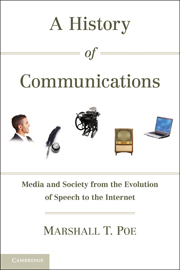1 - Homo Loquens
Humanity in the Age of Speech
Published online by Cambridge University Press: 05 June 2012
Summary
Yes indeed, dear Phaedrus. But far more excellent [than writing], I think, is…the art of dialectic.
– Plato, Phaedrus, 276EMost people know Plato as the world's first philosopher, but he was also the world's first media critic. Plato wanted to find the Truth, and he said that the only way to do it was using a method he called “dialectic.” By this he meant reasoned discussion, a kind of debate in which real people present arguments and other real people affirm or refute them by means of logic. He showed how one could use dialectic to arrive at the Truth in the dialogues for which he is justly famous. Plato, however, not only used his dialogues to demonstrate how to get to the Truth, but also to explain what the Truth was. And one of the Truths he pointed out was that some of his competitors were selling philosophical snake oil. These were the rhetoricians, professional speechwriters in the ancient Hellenic world. They were charlatans, Plato complained, and not really interested in the Truth at all. Rather, their only aim was to teach politicians to flatter their constituents, to feed what Plato pejoratively called the “Great Beast” of public opinion. Instead of showing statesmen the light, the rhetoricians transformed them into pastry chefs who served up sweets according to vulgar tastes without thought as to whether they were healthy or not (Gorgias, 465A). For Plato, you either discuss or deceive. Philosophers discussed, rhetoricians and those they trained deceived. There was no middle ground. It's little wonder that Plato banished rhetoric from the ideal city he described in The Republic. There was just no place for it.
Plato thought people were meant to talk to one another, not at one another. He was more right than he knew. As we’ll see in this chapter, nature fashioned Homo sapiens into a creature both fantastically skilled in dialogic communication and driven to engage in it. We do not talk because we want to. We talk because we have to. In this sense, we are all natural-born Platonists – eager, tireless, unstoppable talkers. Talking is in our natures, so it is with talking that we should begin our history of media and their consequences.
- Type
- Chapter
- Information
- A History of CommunicationsMedia and Society from the Evolution of Speech to the Internet, pp. 26 - 60Publisher: Cambridge University PressPrint publication year: 2010



